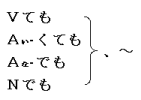The above is used when what is expressed in the main clause is not what is normally expected, meaning "even if; although". These are often used when giving a negative reply to the question "~ば、……か(If ~,……?)". They can also be used as negative replies to the conditional questions using ~と and ~たら.

![]() A: べんきょうすれば、せいせきが上がりますか。
A: べんきょうすれば、せいせきが上がりますか。
Will his grades go up if he studies?

![]() B: いいえ、べんきょうしても、せいせきが上がらないでしょう。
B: いいえ、べんきょうしても、せいせきが上がらないでしょう。
No, his grades probably won't go up even if he studies.

![]() いそがしくても、かぞくにてがみを書きます。
いそがしくても、かぞくにてがみを書きます。
I write to my family even if I'm busy.

![]() この仕事は、らくでも、やりたくありません。
この仕事は、らくでも、やりたくありません。
I don't want to do this job, even if it's easy.

![]() いい天気でも、さんぽに行きません。
いい天気でも、さんぽに行きません。
I'm not going to go for a walk, even if the weather is nice.

![]() べんきょうしなくても、せいせきが上がるでしょう。
べんきょうしなくても、せいせきが上がるでしょう。
His grades will probably go up, even if he doesn't study.

![]() いそがしくなくても、かぞくにてがみを書きません。
いそがしくなくても、かぞくにてがみを書きません。
I don't write to my family, even if I'm not busy.

![]() この仕事は、らくでなくても、やりたいです。
この仕事は、らくでなくても、やりたいです。
I want to do this job, even if it's not easy.

![]() いい天気でなくても、さんぽに行きます。
いい天気でなくても、さんぽに行きます。
I'm going to go for a walk, even if the weather is not good.

